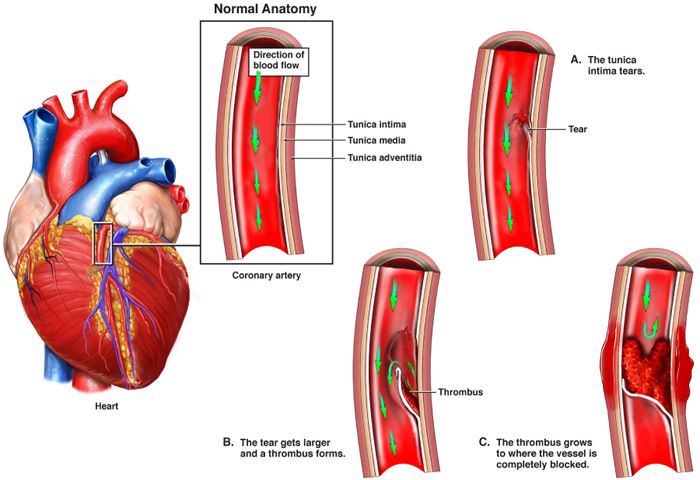Spontaneous Coronary Artery Dissection
Spontaneous Coronary Artery Dissection is a cardiac emergency and can be fatal if not diagnosed and treated quickly. Anyone who experiences an acute onset of chest pain, fullness, discomfort or pressure; shortness of breath; pain or discomfort in one or both arms, the neck, jaw or stomach; breaks out into a cold sweat, experiences nausea, vomiting or passes out should call 911 immediately. The acute onset of these symptoms could indicate the early stages of spontaneous coronary artery dissection, a heart attack, or of another cardiac-related condition.
The heart receives its own supply of blood from the coronary arteries. Each one of these arteries has an artery wall. The artery wall is made up of three thin layers of tissue. When a tear occurs inside the artery wall, blood pools between the inner and outer layers. This trapped blood can lead to the formation of a blood clot, which can partially or completely block blood flow to the heart. If the clot causes a partial blockage, chest pain occurs. If the clot causes a total blockage, a heart attack occurs. Spontaneous coronary artery dissection (SCAD) is an uncommon occurrence and most frequently affects women. But because it occurs spontaneously, it is important to recognize the symptoms and get treatment immediately.

Medical Illustration Copyright © 2019 Nucleus Medical Media, All rights reserved.
Causes of Spontaneous Coronary Artery Dissection
The causes of SCAD are still uncertain, but a tear inside the artery wall is a key factor. However, other conditions, traits or habits may also raise your risk for the disease. These conditions are known as risk factors and include:
Non-Modifiable Risk Factors: These factors are irreversible and cannot be changed. The more of these risk factors you have, the greater your chance of SCAD.
- Female gender
- Giving birth
Modifiable Risk Factors: These factors can be modified, treated or controlled through medications or lifestyle changes.
- Extreme physical exertion.
- Very high blood pressure.
- Long history of cigarette smoking and/or drug abuse.
- Extreme emotional stress.
Other conditions that contribute to SCAD:
- Fibromuscular dysplasia
- Blood Vessel Problems: Abnormalities found within your arteries, veins, and/or capillaries.
- Autoimmune Disease: A condition in which your immune system mistakenly attacks your body (e.g. lupus, rheumatoid arthritis and scleroderma).
Symptoms of Spontaneous Coronary Artery Dissection
Signs and symptoms of SCAD are the same as symptoms of heart attacks and may include:
- Chest pain, fullness, discomfort or pressure.
- Discomfort or pain in one or both arms, the back, neck, jaw, or stomach.
- Lightheadedness/Fainting
- Fatigue
- Rapid heart rate (tachycardia) of more than 100 beats per minute.
- Heart palpitations
- Shortness of breath
- Nausea and/or vomiting
- Sweating
Diagnosis of Spontaneous Coronary Artery Dissection
Your medical team will ideally ask you to describe your symptoms and have your blood pressure, pulse and temperature checked. After that, your doctor may recommend diagnostic tests. Some of the diagnostic tests and procedures include:
Treatment of Spontaneous Coronary Artery Dissection
The treatment most appropriate for you will depend on your condition, including the size and location of the tear in your artery, as well as any signs or symptoms you're experiencing. Whenever possible, doctors allow the damaged artery to heal on its own, rather than repairing it through invasive procedures. For some people, medications may relieve symptoms of spontaneous coronary artery dissection (SCAD). In these situations, it may be possible to be treated by medications alone. If chest pain or other symptoms persist, other treatments may be needed. Treatment options include:
Medications
- Aspirin will treat pain, inflammation and reduce risk of a heart attack.
- Thrombolytic therapy is the administration of drugs called “lytics” or “clot busters” that will help break up or dissolve blood clots.
- Anticoagulants “blood-thinners” will help treat, prevent, and reduce blood clotting.
- Any combination of the above.
